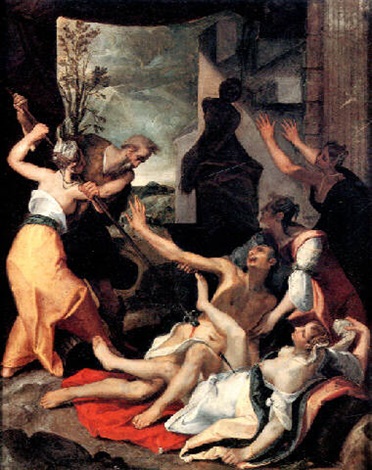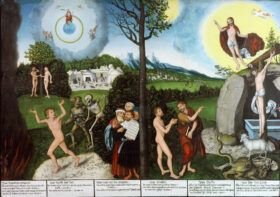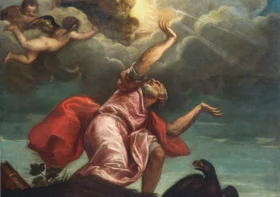Corporate Faith in a Personal God

Phinehas slaying Zimri and Cozbi the Midianite (1570-1603) by Joos van Winghe
Parashat Pinchas
Numbers 25:10-30:1
23 July 2022
Shabbat shalom! This week’s parsha is named after one of its key players, Pinchas
(or, in English, Phineas), and it spans Numbers 25:10-30:1. I submit to you that, by
examining Phineas and others in this text, we might build a robust picture of how
God uses the dynamic interplay between individual and corporate faith to
accomplish His purposes. We will see how both matter to God and how He often
uses one to shape the other.
Our parasha picks up halfway through the story of Phineas. Previously, Balak, King
of Moab, fearing Israel traveling through his land, convinced the pagan prophet
Bilaam to curse them. Fortunately, God is as much Lord of spirits as He is Lord of
tongues. With each attempted curse, Bilaam could only utter blessings. But the
Enemy knew his target well and, through Bilaam’s advice, enticed Israel into
idolatry. Balak sent seductive Moabite women to lure Israeli men to offer sacrifices
to Ba’al. Well, it worked, and when the men fall, society as a whole is not far
behind. God punished their betrayal by commanding the execution of those men
who participated and by sending a plague that killed 24,000 Israelis in one day.
Surely, God’s point could not have been more clearly or drastically made, yet one
particularly impudent scoundrel spurned it. In full sight of those weeping over their
lost family and friends, Zimri son of Salu audaciously took a Midianite woman into
the tent of his family—yes, his family—and did the unspeakable. Well, if there is
one redeeming part of the couple’s treachery, it is that their compromising position
made it all the easier for Phineas, the Lord’s faithful servant, to spear both of them
through simultaneously.
In the next chapter, the Lord orders that a census be taken to gauge the size of the
Israeli’s prospective army. After all, the Canaanites and Philistines were not exactly
going to hand over the Promised Land when asked nicely. The census showed that
Israel had 601,730 males over the age of 20. For comparison, that’s not too far
behind the population of Detroit. It’s also exactly 1,820 fewer men than there were
after escaping Egypt. It seems 40 years of wandering in the desert had taken its toll.
Immediately following this census, the Lord set His sights on dividing up the land
for inheritance purposes. He commanded that the tribes receive land in proportion
to their size. The inheritance laws seemed to work well for everyone… everyone,
that is, except one family. Allow me to introduce you to the daughters of
Zelophehad. Their father had previously perished in the wilderness. Having borne
no sons, his daughters thought it only fair that they inherit his land. They brought
their case before Moses who then brought it to the Lord. Adonai clearly and
unambiguously recognized their rightful ownership of the land.
Jumping further into chapter 27, we are allowed a window into a private
conversation between Moses and the Lord. God tells Moses to climb mount Abarim
to behold the Promised Land. This is a bitter-sweet command, as Moses is
privileged to lay eyes on the fruit of 40 years labor yet immediately after doing so,
the Lord says he will join his brothers in Sheol, never to taste its richness, all
because of his unfaithfulness at the waters of Meribah. Like any good spiritual
leader, only one thing loomed large in Moses’ mind and heart: who will shepherd
my people after I am gone? He beseeches God to appoint a suitable replacement,
and he does so using what is, in my opinion, one of the most powerful names for the
Lord: the God of the spirits of all flesh. He responds by choosing Joshua the son of
Nun to be inaugurated in a special religious ceremony. Why him? Quite simply,
Joshua was indwelled by the Holy Spirit.
The parasha concludes with a series of reiterated dictates concerning the sacrifices
to be made at various times and occasions. These sacrifices are each unique and
worth studying in their own right, but what they all hold in common is that they are
all for the glory of God and for the good of the community. That is, they work to
bring fullness and redemption to the whole of Israel. Opposite this corporate
relationship with God is our individual relationship with Him. We have three
examples from today’s text.
First is Phineas. In the face of egregious unfaithfulness, he took individual action
without consulting the corporate body chiefly offended. Yet, it was because of his
zeal that the Lord made a covenant of peace with and a perpetual priesthood out of
him and his descendants. Not only that, but God also spared all of Israel on his
account. Individual faith rippled into familial and corporate faith.
Second is the case of Zelophehad’s daughters. These daughters had the boldness to
approach Moses over a perceived injustice, and what was the result? God actually
amended the laws to make daughters the inheritors in the absence of sons, brothers
the inheritors in the absence of children, the father’s brothers the inheritors in the
absence of brothers or children, and the nearest clan kinsman the inheritor in the
absence of all family. Individual action prompted God to fill a void in His corporate
system.
Finally, it was the Holy Spirit living and reigning in one man, Joshua, that led to all
of Israel entering the Promised Land. Even with 601,730 young men at His
disposal, God delighted to use just one to fulfill His purpose. In this way, Joshua
was a type of Messiah. Jesus, of course, is the paragon, the apotheosis, of individual
faith affecting the corporate body. Just listen to what the God-man accomplished for
us:
Colossians 1:17-20 “And he is before all things, and in him all things hold together. And he is the head
of the body, the church. He is the beginning, the firstborn from the dead, that in
everything he might be preeminent. For in him all the fullness of God was pleased
to dwell, and through him to reconcile to himself all things, whether on earth or in
heaven, making peace by the blood of his cross.”
Yes, Israel is His chosen nation. Yes, the church is His bride. Yes, we are one body
in Christ. But, no, we are not all the same, and we do not all fill the same role. God
has the ability to use each of us, individually, for the good of His corporate body.
But are you, for your part, willing to take up that assignment and walk in it?




Gal Jerman
Top site ,.. amazaing post ! Just keep the work on !